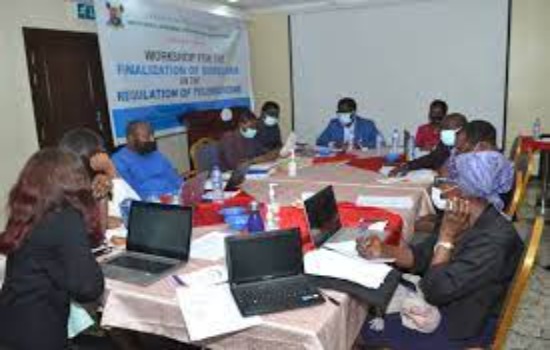Lagos health agency to validate standard, provide guidelines for practice of telemedicine
The Lagos State Health Facilities Monitoring and Accreditation Agency’s (HEFAMAA) has at her recent Telemedicine Standards Validation meeting, presented a comprehensive overview of telemedicine’s evolving landscape and its various deployment strategies.
Highlighting the rapid evolution of technology, particularly in healthcare, the Commissioner for Health in Lagos State, Prof. Akin Abayomi emphasized the need for diverse telemedicine methods.
“Lagos State responded to the challenges posed by the COVID-19 outbreak by effectively managing patient diagnoses through a detailed telemedicine strategy. This allowed remote monitoring of patients at home or in hotels, ensuring timely interventions and medication dispatch, especially for those showing signs of deterioration”, he said.
Underlining the importance of local regulation and governance, the commissioner stressed the necessity to monitor and track telemedicine’s impact on citizens within the state.
Addressing the meeting’s participants, the Commissioner raised concerns about regulating remote care provided internationally from various parts of the world.
He emphasized multiple aspects of telemedicine: infrastructure, monitoring consultants’ qualifications, clinical governance, continuum of care, and data protection.
Abayomi highlighted the State government’s commitment to ensuring citizens’ data security in virtual consultations, showcasing previous compliance achievements in data protection regulations.
Regarding telemedicine service payments, the commissioner detailed various options, including out-of-pocket, insurance-based, government-subsidized, and inclusion in insurance service packages.
Addressing unauthorized telemedicine practices, the commissioner assured swift regulatory action based on information collected from various sources, including citizens’ reports and healthcare facilities.
The Commissioner outlined ongoing efforts to establish a policy framework and roadmap, eventually leading to legislative measures, considering the rapidly evolving telemedicine landscape.
Earlier, the Special Adviser to the Governor on Health, Dr. Kemi Ogunyemi, hailed the emergence and widespread adoption of telemedicine as a revolutionary opportunity in healthcare delivery. She commended Lagos State for spearheading innovative measures to bolster citizen well-being through groundbreaking technological advancements.
Highlighting the focus on telemedicine standards, she emphasized their alignment with local healthcare needs, regulatory frameworks, and the diverse expectations of the communities served.
Describing Lagos State’s healthcare system as diverse as its population, Dr. Ogunyemi emphasized the intersection of tradition and modernity in the state’s healthcare landscape. She stressed the importance of crafting telemedicine standards that are not only robust and acceptable but also sensitive to the unique nuances of the local healthcare ecosystem.
The Special Adviser emphasized that validating telemedicine standards requires collaborative efforts, inclusivity, and a collective commitment among stakeholders representing various aspects of healthcare delivery, technology, policy, and patient advocacy. She recognized the diverse perspectives present as a strength, essential for addressing the multifaceted challenges associated with telemedicine implementation.
Chairman of the Health Facilities Monitoring and Accreditation Agency (HEFAMAA), Dr. Yemisi Solanke-Koya, underscored the transformative power of telemedicine, emphasizing its role in overcoming barriers and ensuring access to healthcare services, especially during crises when physical distances present challenges.
She noted that meeting aims to establish validated telemedicine standards that uphold excellence and accessibility in healthcare provision while maintaining the highest patient care standards.
Emphasizing the shared goal of leveraging telemedicine for positive change, Dr. Solanke-Koya urged attendees to focus on enhancing healthcare quality, reaching underserved communities, and filling gaps within the current healthcare system.
She stressed the need for an environment that encourages diverse perspectives to converge, fostering innovation and refinement of telemedicine standards in alignment with technological advancements and the evolving healthcare landscape in Lagos State.
Executive Secretary of HEFAMAA, Dr. Abiola Idowu reflected on the origins of the telemedicine standards validation journey, emphasizing its inception in 2021.
Recognizing the emergence of technology-driven healthcare services without adequate regulation, Dr. Idowu underscored the rapid evolution of these technologies, necessitating a vital need for regulatory frameworks.
Acknowledging the complex landscape of telemedicine, Dr. Idowu highlighted the importance of collaborative efforts.
She disclosed that HEFAMAA engaged various stakeholders within and beyond the healthcare sector, fostering collaborations with entities such as the Corporate Affairs Commission, the National Data Protection Authority, and network providers, adding that these collaborations aimed to create comprehensive guidelines ensuring effective regulation of telemedicine practices.
She noted that the Telemedicine guidelines serve as a benchmark against which clinical services can be measured, and a framework for existing facilities to review and improve their service provision in order to maintain the safety and quality of service to patients, and provide an environment conducive for the staff.
“These standards are considered to be achievable standards of practice. They are ideal standards to which all telemedicine practitioners should aspire as part of their professional responsibility to both their patients and staff. In addition to meeting the standards described below, all organizations offering telemedicine services must have a business location registered with the Corporate Affairs Commission (CAC). Telemedicine is the use of Information and Communications Technology (ICT) for the delivery of health care services”, She explained.
Dr. Idowu expressed gratitude to the expert contributors who had been instrumental in formulating these standards, noting that the meeting served as a platform to review and validate these standards, setting the stage for their implementation.
Dr. Idowu emphasized the ultimate objective to ensure the safety and well-being of patients in Lagos State by providing practitioners with standardized guidelines for telemedicine practice.
In summary, the meeting reiterated the government’s commitment to regulating telemedicine while ensuring citizens’ safety and access to quality healthcare in this digitalized healthcare era.




